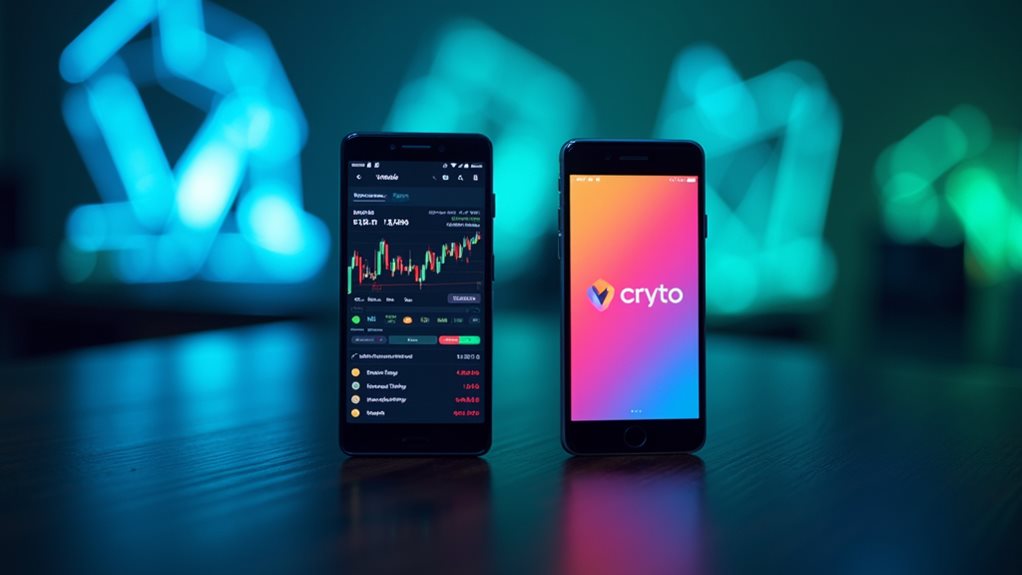For crypto newbies, simplicity is king. Coinbase leads the pack with its beginner-friendly interface, while eToro lets you copy successful traders’ moves. Gemini offers low-cost card purchases at 3.49%, and Kraken keeps fees minimal (0-0.40%). Robinhood attracts penny-pinchers with zero crypto trading fees. Look for apps with built-in education, strong security measures, and low investment minimums. Your perfect platform depends on whether you’re a HODLer or day trader. The right choice makes all the difference.
Why Beginners Need Specialized Crypto Investment Apps

Why jump into crypto’s deep end when you can wade in safely? The crypto world isn’t exactly known for being gentle to newcomers.
Let’s be real—one wrong click could cost you.
In crypto, mistakes aren’t just embarrassing—they’re expensive. Your financial future deserves better than trial-and-error.
Specialized apps offer user-friendly interfaces that won’t make your brain hurt. They include guided tutorials that actually make sense. No PhD required.
Security measures? Yeah, they’re beefed up for people who mightn’t know a private key from a car key. Top apps implement two-factor authentication to protect your investments from unauthorized access.
Educational resources come built-in, so you’re not frantically Googling “what is blockchain” at 2 AM. With yield-bearing stablecoins gaining popularity, beginners need reliable guidance more than ever.
Risk management tools prevent your portfolio from imploding during your first week.
And when you’re completely lost? Community support swoops in. Because everyone remembers being the confused newbie once. Platforms like Coinbase offer free Bitcoin to new users after their first trade, incentivizing you to learn by doing.
Top 5 User-Friendly Crypto Apps for First-Time Investors

Five apps stand out in the crowded crypto marketplace for newcomers.
Coinbase tops the list—widely recommended for beginners with its straightforward interface. No minimum requirements. Just jump in.
Gemini offers surprisingly low-cost credit card purchases at 3.49%. Not bad in today’s market.
eToro brings something different: social trading. Copy successful investors’ crypto trends while you learn. Brilliant, really.
Kraken’s fees are ridiculously low (0-0.40%). Your wallet will thank you. Plus, room to grow as your investment strategies evolve.
Don’t overlook apps with micro-investing features. They’re gamifying crypto with badges and quizzes. Learning while investing pennies? Smart move.
Each platform has trade-offs. Higher fees for simplicity. Lower costs with steeper learning curves. Pick your poison.
Robinhood stands out with its no fees for cryptocurrency trades, making it an excellent choice for cost-conscious beginners despite its limited selection of digital assets.
For monitoring crypto prices across different platforms, CoinMarketCap provides live price tracking for thousands of cryptocurrencies with customizable watchlists.
How to Choose the Right Crypto Platform Based on Your Goals

Choosing the right crypto platform isn’t just about slick interfaces or low fees—it’s about alignment with your personal investment strategy. Start by defining exactly what you want. HODLer? Day trader? Yield farmer? Each requires different tools.
Platform reliability matters more than you think. Those flashy new exchanges? Great until they’re hacked or shut down overnight. Look for regulatory compliance and solid security features like 2FA and cold storage. Legitimate platforms prioritize AML compliance to protect both their users and the integrity of the market. The best platforms also incorporate a diverse range of crypto assets to provide you with comprehensive market exposure.
Your investment strategies should dictate your choice. Passive investors need simplicity and good fiat on-ramps. Active traders? You’ll want low spreads, advanced orders, and killer liquidity.
Fees can make or break returns. Small trades? Watch those minimums. Large portfolio? Volume discounts become your best friend.
Finally, don’t underestimate good educational resources. Even experts need guidance sometimes.
Understanding Fee Structures Before You Invest

Now that you’ve picked your platform, let’s talk about the silent profit-killer nobody mentions at crypto parties: fees.
They’re everywhere, hiding in plain sight. Maker fees (0-0.2%) reward you for adding liquidity through limit orders. Taker fees? Higher (0.05-0.6%) because you’re removing liquidity. Big difference. Using hardware wallets for secure storage can help protect your assets from potential exchange hacks.
Any serious cost analysis reveals fee structures aren’t created equal. Some platforms charge up to 3.49% just to deposit via card. Ridiculous.
The truth? Fee comparisons matter more than those flashy ads suggest. Withdrawal fees include fixed costs plus unpredictable network fees. High-volume traders often receive fee incentives based on their trading activity levels.
And don’t get me started on “simplified” interfaces that hide the real costs. Some exchanges charge 1.49% on their app but only 0.2% on their pro platform. Same company, vastly different fees. Your profits are on the line.
Exchanges like Binance offer among the lowest trading fees and highest trading volume in the market, making them attractive for cost-conscious investors.
Security Features That Protect Your Crypto Assets

While crypto enthusiasts talk endlessly about moonshots and lambos, they’re suspiciously quiet about the elephant in the room: security. Let’s fix that.
Top investment apps implement robust key management and encryption methods that keep your private keys safe—because once they’re gone, so is your money. Period.
Look for platforms offering multi-factor authentication measures beyond the basic password. SMS codes? Decent. Authenticator apps? Better.
Cold storage is non-negotiable. The best apps keep 90%+ of assets offline, away from hackers’ greedy fingers.
Multi-signature wallets require multiple approvals, so one compromise doesn’t drain your account.
Advanced fraud detection systems monitor for suspicious activity 24/7.
But here’s the uncomfortable truth—user awareness remains your best defense. All the security protocols in the world won’t protect you if you’re careless. The most secure apps utilize decentralized networks that distribute data across multiple nodes, making unauthorized changes virtually impossible. Regulatory compliance is crucial, as platforms with proper licenses provide an additional layer of protection and accountability for investors.
Account Setup and Verification Requirements

The account setup process for crypto apps isn’t exactly a thrilling adventure, but it’s your unavoidable first step into the digital asset world.
Every platform starts with basic account creation—email, password, done. Then comes the fun part: proving you’re actually you.
Identity verification is serious business. You’ll hand over government IDs, take selfies, and maybe even do a live video check. Why? Because regulators say so. Period.
- Most apps use third-party services like Plaid to link your bank account securely
- Verification timing varies wildly—could be minutes, could be days
- You’ll need to fund your account via bank transfer, debit card, or wire
- Wallet initialization often requires saving seed phrases (offline, not in a text file!)
Many platforms offer both custodial wallets where the exchange controls your keys and non-custodial options for those seeking more security.
No verification, no trading. That’s just how it works.
For beginners, platforms like Coinbase are recommended due to their user-friendly interface and straightforward KYC process.
Investment Minimums and Getting Started With Limited Capital

Breaking into crypto doesn’t require a trust fund or a tech mogul’s bank account. Seriously. Some platforms let you start with practically nothing.
Pocket Option accepts a mere $5 minimum investment. That’s less than your fancy coffee. Fusion Markets, eToro, and Robinhood? Zero minimum deposits. Yeah, zero. Capital accessibility has never been easier.
But watch out. Low entry points have pitfalls. Limited funds might tempt you to over-leverage. Bad idea. Some platforms restrict features for small accounts or hide fees that eat your tiny balance.
Smart move? Practice with demo accounts first. Pocket Option gives you $50,000 in play money. Learn without bleeding real cash.
And consider platforms allowing fractional trades—they’ll stretch your limited capital further. Platforms with low deposits enable experimentation with strategies without putting significant money at risk. Many exchanges offer multiple deposit methods including bank transfers, credit cards, and digital wallets for easier account funding.
The crypto door is open. Even for the broke.
Key Features That Make Learning Crypto Easier

Now that you’ve found affordable ways to dip your toe in crypto waters, let’s talk about features that won’t leave you drowning in confusion. The best crypto apps use AI to deliver personalized insights that actually make sense. No finance degree required.
- Simplified dashboards that highlight opportunities without the jargon-filled nonsense
- Micro-investing capabilities letting you buy tiny slices of expensive coins (because who’s $30K for one Bitcoin?)
- Gamified learning with points, badges, and achievements that make finance feel less like watching paint dry
- Community features where you can follow experts or chat with fellow newbies about their mistakes
These platforms track everything across multiple wallets too. Your portfolio, all in one place. Revolutionary, right? The most effective apps also include comprehensive educational tools that guide beginners through investment strategies and market analysis. For maximum security, consider apps that support integration with hardware wallets rather than leaving your crypto on exchanges.
Comparing Popular Apps: Coinbase vs. Robinhood vs. Others

When comparing popular crypto apps, you’ll quickly discover they’re not all created equal.
Coinbase advantages include massive selection (250+ cryptocurrencies) and robust security with 98% cold storage.
Robinhood limitations? Just 18-50 coins. Period.
Fee analysis reveals a simple truth: Robinhood wins for small trades under $10K with its spread-based model.
Bigger investor? Coinbase Advanced might save you cash.
Security comparisons favor Coinbase—they’re obsessive about offline storage.
User experience? Both solid, but different priorities.
Robinhood integrates stocks and crypto. Coinbase goes all-in on crypto education.
Asset accessibility matters. Trading features too.
Your investment strategies should determine which platform fits.
Want everything under one roof? Robinhood.
Serious crypto collection? Coinbase.
Both platforms face criticism for slow customer support response times which can frustrate users during urgent situations.
Robinhood generates revenue primarily through payment for order flow, which has raised concerns about pricing transparency for traders.
No contest.
Building a Diverse Portfolio With Beginner-Friendly Platforms

Building a diverse crypto portfolio doesn’t require a finance degree, thanks to today’s beginner-friendly platforms. Portfolio tracking apps like CoinMarketCap and Delta make monitoring your crypto mix ridiculously simple. They’re free. They’re intuitive. They show exactly what you own.
Your diversification strategies just got easier with apps offering:
- Commission-free trades that won’t punish you for rebalancing
- Fractional investing options to spread small amounts across multiple coins
- Automated portfolio management for the “I’d rather be doing anything else” investor
- Real-time syncing across devices so you’re never out of touch with your money
Security matters too. Look for platforms with two-factor authentication. Because nothing ruins your day quite like someone stealing your carefully diversified crypto collection. For enhanced protection of your assets, experts recommend using hardware wallets when your portfolio grows significantly. Understanding inherent risks associated with cryptocurrency investments is crucial before committing your funds. With traditional banks now permitted to offer crypto services, investors can expect more secure and regulated platforms to emerge in the coming months.
Frequently Asked Questions
Can I Transfer Crypto Between Different Investment Apps?
Yes, you can transfer crypto between apps if they’re compatible with the same cryptocurrency and network. Check both apps’ crypto transfer limits and address requirements first to guarantee a successful transaction.
How Are Crypto Investments Taxed in the US?
You’ll pay capital gains tax when selling or trading crypto, with rates depending on how long you’ve held it. The IRS also taxes mining, staking, and airdrops as ordinary income. Crypto tax implications vary by activity.
What Happens to My Crypto if the App Company Goes Bankrupt?
If your crypto app goes bankrupt, your assets might become part of their bankruptcy estate. You’d likely be an unsecured creditor with limited recovery. Self-custody using hardware wallets provides better crypto app security against bankruptcy implications.
Are Crypto Investments Insured Like Traditional Bank Accounts?
No, your crypto investments aren’t insured like bank accounts. Unlike FDIC-protected bank deposits, most crypto lacks government-backed insurance. You’ll need private crypto insurance for investment protection against hacks, theft, or exchange failures.
Can I Automatically Schedule Recurring Crypto Purchases?
Yes, you can set up recurring crypto purchases on many platforms like Crypto.com, Binance, and Cash App. These automated investing features let you schedule daily, weekly, or monthly buys to build your portfolio consistently.









